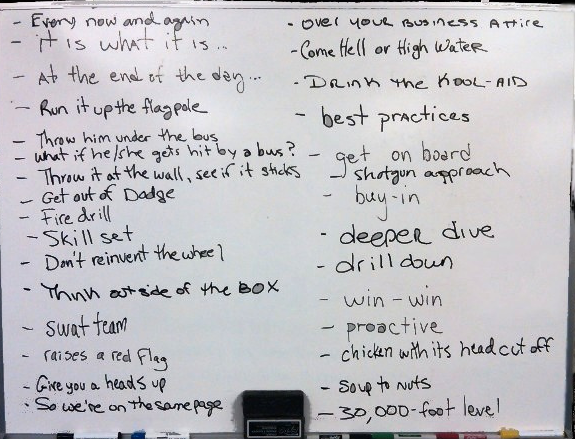SEO Cliches – Do They Hold True?
Every now and again, we always need to be proactive with our skill set and check we are up to speed with best practices. From a 30,000 feet level, we try to make sure everyone is on the same page without reinventing the wheel. At the end of the day, if we can think outside of the box, throw a few things at the wall and see what sticks, it’s a win-win.
That all sounded a bit cliched didn’t it?
Well, it was all cliche. But did any of it make sense?
Cliches are fascinating, since there very existence is born out of an axiom or self-evident truth. In SEO, I find myself repeating the same terms, often out of habit, but also because from an understanding perspective they do provide structure.
There is a danger of repeating cliches especially in SEO, because the ‘best practices‘ are changing all the time. What held true a few years ago can be outdated after a simple search engine algorithm change like Google Panda for instance. The sports industry can get away with it.
Unless the rules of a game change, players and coaches can always trot out the same bland cliches in post-match interviews, like ‘it was a game of 2 halves‘ or ‘we’ll take one game at a time’. In SEO, the goal posts often move.
Here are a few of my favorite SEO cliches:
1. Content is King
An oldie but a goodie. It’s simplistic but when you break you break down the intrinsically complicated search algorithm, it simply wants better websites. This mostly has to do with content. The search engines are picking up an array of signals that indicate if users like a website or blog and are making adjustments all the time, to weed out bad content (see Panda update). Simply stuffing keywords on a page won’t help.
The 1-2 punch though, is good content that is engaging, so this means attractive to look at and highly usable. The navigational experience and error-prevention needs to be low, so check for broken links and images and always provide the user with somewhere to go to next. I like copy that is easy to scan and contains images and/or video, both of which search engines can index.
2. Search Engine Food
What do search engines eat might you ask?
Well you could say they like a raw food diet. They don’t like junk food, so stay away from spammy content like keyword stuffing and overusing internal links. Good, easily digestible, healthy content in the form of links, copy, headings, meta data, video and images are all on the menu.
Typically an on-site blog (such as a blog sub-domain) is a good snack, since it’s fresh content feeding a website or simply having a blog site is designed for up to date content. When you post a new blog, the blog technology will alert search engines that there is something to come back an crawl. It’s a win-win! 🙂
3. All links are not created equal
This one is common sense really, although it can be easy to get sucked into a bad link exchange or think that quantity is the goal. Most sites have to rely on a few good ones as opposed to an outrageously good one, but it happens. If you are approached about a link exchange, try to run a few tests on the linking site to check for relevance to yours, quality of links to their site from others and how long their domain has been around for in it’s current guise. A good free tool to use is Open Site Explorer.
The more your blog and website can becomes an authority on a subject, the more likely other people will come knocking, by running a search query and perhaps bookmarking your site and linking to it. My personal blog recently got the attention of a London newspaper out of the blue, so remain positive!
4. Nothing Happens Overnight
The kind of things that happen overnight are generally bad, like being hacked into or your website going off-line. For positive things like improved SERPs or link-building, you may be lucky if anything happens over the next year. Most people understand this maxim, so the trick is figuring out at what point will ‘things happen’. The overall trust and authority (a cliche again there) are the main factors, gained from solid on and off page SEO built up over time.
If you are lucky to have an idea or product that gains instant promotion or viral success, then these things can be greatly accelerated, so don’t underestimate traditional marketing to build up online traction too. If enough ‘relevant and trusted’ sources dig your content, then search engines will pay attention to this.



Pingback: A Trip Down Random Access Memory Lane | Best of USM Blog